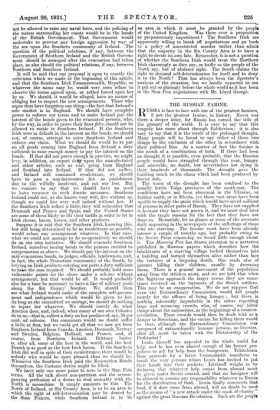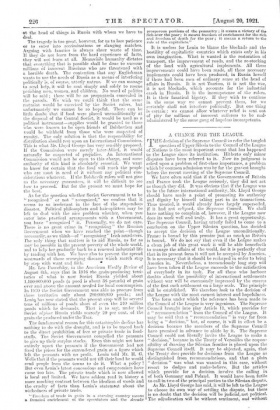THE RUSSIAN FAMINE.
The worst of the drought has been confined to the usually fertile Volga provinces of the south-cast. The conditions have not been abnormal in the Ukraine, or further south, or in Siberia, yet these vast areas have been unable to supply the grain which would have saved millions of persons in other parts of Russia. They have not supplied it because they have not grown it, and we must deal later with the tragic reasons for the fact that they have not done so. Meanwhile, let us glance at some of the accounts daily appearing in the newspapers of the sufferings of those who are starving. The famine must have been already intense a couple of months ago, but probably owing to the Soviet Press censorship we heard little enough about it. The Morning Post has drawn attention to a narrative published in Russian papers which describes bow the inhabitants of a starving village locked themselves into a building and burned themselves alive rather than face the tortures of a lingering death. One reads also of parents killing their children, usually by drowning them. There is a general movement of the population away from the stricken areas, and we are told that when the fugitives approach the larger towns they are some- times received on the bayonets of the Soviet soldiers. This may be an exaggeration. We do not suppose that even the Extraordinary Commission would kill people merely for the offence of being hungry ; but there is nothing inherently improbable in the rulers regarding large and menacing crowds, who, of course, say bitter things about the authorities, as the beginnings of a counter- revolution. These crowds would then be dealt with as a danger to Sovietism, and the excuse for killing them would be that, although the Extraordinary Commission was composed of extraordinarily humane persons, no liberties, after all, must be taken with the Dictatorship of the Proletariat !
Lenin himself has appealed to the whole world for help, and he has even abated enough of his former pre- judices to ask for help from the bourgeoisie. Tchitcherin then proceeds by a bitter Communistic manifesto to insult the very persons whom Lenin has invited to put their hands into their pockets. Litvinoff weighs in by declaring that whatever help comes from abroad must be given under Soviet control, and that no foreigner will be allowed to assume any responsibility whatever in Russia for the distribution of food. Lenin finally comments that food, if it does come from abroad, will no doubt be used as the means of " a new attack under the mask of charity against the great Russian Revolution. Such are the people -at the head of things in Russia with whom we have to 'deal.
The tragedy is too great, however, for us to lose patience or to enter into recriminations or slanging matches. Arguing with fanatics is always sheer waste of time. If they do not learn from the hard experience of facts, they will not learn at all. Meanwhile humanity dictates that everything that is possible shall be done to succour millions of innocent Russians who are threatened with a horrible death. The contention that any Englishman wants to use the needs of Russia as a means of interfering politically is, of course, utterly untrue. If we can manage to send help, it will be sent simply and solely to rescue perishing men, women, and children. No word of politics will be said ; there will he no propaganda concealed in the parcels. We wish we could think that the same restraint would be exercised by the Soviet rulers, but unfortunately 'we cannot be so hopeful. There can be little doubt that if food were placed unconditionally at the disposal of the Central Soviet, it would be used as a political instrument—supplies would be granted to those who were known to be open friends of Bolshevism and rould be withheld from those who were suspected of enmity. The only solution is that the responsibility for distribution should rest upon an International Commission. This is what Mr. Lloyd George has very sensibly proposed. If the Commission were merely inter-Allied, it would naturally be suspected of prejudice. An International Commission would not be open to this charge, and some authority of this kind is absolutely essential. We want to know for certain that the food will reach the people who are most in need of it without any political con- siderations whatever. If the Bolshevik rulers will not give us the necessary guarantees, it will be difficult to see how to proceed. But for the present we must hope for the best.
As for the question whether Soviet Government is to be " recognized " or not " recognized," we confess that it seems to us irrelevant in the face of the stupendous disaster. Political philosophers and hair-splitters may be left to deal with the nice problem whether, when you enter into practical arrangements with a Government, you have " recognized " it. Personally, we do not care. There is no great crime in " recognizing " the Russian Government when we have reached the point—though necessarily, as we think—of " recognizing " Irish murderers. The only thing that matters is to aid" Russia, as far as may be possible in the present poverty of the whole world, and to help her gradually back to a renewed industrial life by trading with her. We have also to prevent the spread westwards of those scourging diseases which march step by step with want and filth. • Mr. Leo Pasvolsky, in the American Weekly Review of August 6th, says that in 1916 the grain-producing terri- tories of what is now Soviet Russia yielded about 1,100,000,000 poods (a pood is about 36 pounds) of grain over and above the amount neecled for local consumption. In 1920 the Soviet Government was able to procure from these territories only about 280,000,000 poods ; and Lenin has now stated that the present crop will be several tens of millions of poods short of even the 2.10 million poods which he demands. That is to say, under the Soviet 'time Russia yields scarcely 20 per cent. of the grain she produced under the Tsar.
The fundamental reason for this catastrophic decline has nothing to do with the drought, and is to be traced back to the direct prohibition of free or private trade in food- stuffs. The Soviet Government compelled the peasants to give up their surplus stocks. Even this might not have entirely upset the peasants if the Government had not fixed the prices for the surrendered grain at a figure which left the peasants with no profit. Lenin told Mr. H. G. Wells that if the peasants would not till their land he would send people from the towns to do it. What a policy I But even Lenin's latest concessions and compromises have come too late. The private trade which is now allowed is local and limited. We have seldom read in history a more mocking contrast between the idealism of words and the cruelty of facts than Lenin's statement about the wickedness of private trade.
" Freedom of trade in grain in a starving country means a frenzied enrichment of the speculators and the already prosperous portions of the peasantry ; it means a victory of the rich over the poor ; it means freedom of enrichment for the rich and freedom of death for the poor ; it means a return to the rule of the capitalists."
It is useless for Lenin to blame the blockade and the hostility of capitalistic countries which exists only in his own imagination. What is wanted is the restoration of transport, the improvement of roads, and the re-stocking of the land with agricultural implements. All these improvements could have been made, all these necessary implements could have been produced, in Russia herself if there had been men of ordinary sense at the head of affairs in Russia. It is not Tsarism, it is not the war, it is not blockade, which accounts for the industrial crash in Russia. It is the incompetence of the rulers. It is their fanatical bigotry. If they wish to continue in the same way we cannot prevent them, for we certainly shall not interfere politically. But one thing is certain : we cannot allow whatever relief is sent out of pity for millions of innocent sufferers to be mal- administered by the same gang of hopeless incompetents.



































 Previous page
Previous page